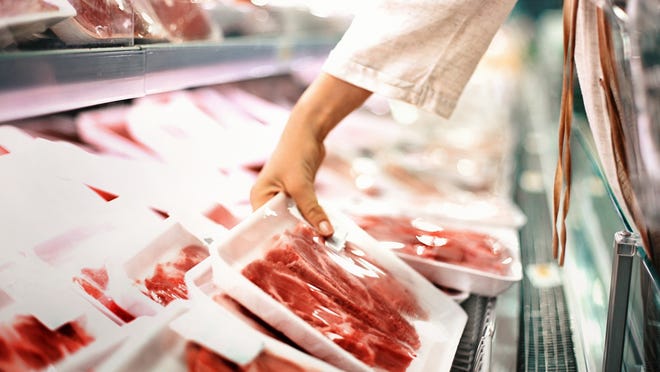Beef Consumers Verse Beef Producers Dollar Sign
Corrections & Clarifications: This story has been updated to correct the employ of fat versus feeder cattle, and to include market prices for alive cattle.
The claim: At that place's no shortage of beef, just consumers pay more than while cattle farmers lose coin
Are consumers paying more for beefiness while farmers lose money?
That merits appears in a post May 22 by Facebook user Rick Davis. Meat processing companies such as Tyson Foods, JBS, National Beefiness and Cargill are "stealing" from cattle farmers by paying less for beef while charging more than to the consumer, he said.
Davis claimed that the sale price of "fat," or live cattle dropped from $1.55 a pound to 91 cents a pound during an unspecified time frame. All the same corporations blame the rising toll of meat at grocery stores on shortages caused past the coronavirus outbreak, Davis wrote.
"At that place IS NO Beefiness SHORTAGE!! Someone is profiting huge off the backs of Farmers and sticking it to the consumer on the other end!!!? THIS IS A TRAVESTY AND NEEDS TO Finish!!" Davis wrote.
USA TODAY could not reach Davis for comment.

Is there a beefiness shortage?
The beef manufacture has taken a hit in recent months considering of business closures, stay-at-habitation orders in many states and quarantines during the coronavirus outbreak.
USA TODAY reported that the number of coronavirus cases tied to meatpacking plants passed 10,000 in early May, preceding shutdowns of at least 40 meat slaughtering and processing plants for several weeks.
Beef and pork processing was reduced past 40% from concluding twelvemonth, according to The Associated Press. The number of meat items bachelor for purchase was limited as a effect, the Milwaukee Journal Sentinel reported.
Are consumers really paying more for cheaper beef?
The 52-week low for alive cattle prices was 81 cents a pound, according to Business Insider.
In the past vi months, live cattle prices dropped from $i.27 a pound in January to 90 cents a pound on April 30, the last date recorded, Business Insider reported.
Consumer market prices for uncooked ground beef rose by 38 cents a pound, all uncooked beef roasts rose past $one.17 a pound and all uncooked beef steaks rose by a dollar a pound from April to May, according to the U.S. Bureau of Labor Statistics.
Where's the beef ... and the craven? Should we worry almost a meat shortage?
Investigating the difference
Secretary of Agriculture Sonny Perdue best-selling the discrepancy in farm-to-market beef prices in a tweet Apr 8 and committed to an investigation.
"(USDA's) Packers and Stockyards Division will exist extending our oversight to determine the causes of divergence between box and live beef prices, beginning with the Holcomb Burn in KS last summertime and now with COVID-19," Perdue tweeted.
"Holcomb Burn" refers to a burn that ravaged a Tyson meatpacking plant in Holcomb, Kansas. The establish produced about 5% of the nation'southward beef, co-ordinate to KCUR News.
Dirk Fillpot, a communication coordinator for the USDA, said the agency is still monitoring the situation months afterward Perdue's statement.
"USDA is actively monitoring all nutrient and agriculture article markets and the food supply chain during the COVID-19 outbreak. USDA's Agricultural Marketing Service continues to monitor market conditions and behave economic analysis on the poultry and livestock industry," Fillpot wrote in an electronic mail.

Twenty senators and 11 land attorneys general requested federal investigations into market place manipulation by the meat industry, Pol reported.
Kansas Chaser General Derek Schmidt is ane of the 11 attorneys general who signed a alphabetic character to U.Due south. Chaser General Beak Barr asking the Department of Justice for an investigation. Other signers included Attorneys Full general Keith Ellison of Minnesota and Tim Flim-flam of Montana.
"The underlying frustration of many cattle producers and feeders boils downwards to this: Why are they being paid significantly less for live cattle when consumers are paying more for beefiness on the grocer's shelf? Information technology is a reasonable question that deserves a review and fully informed reply," Schmidt said, according to a news release May 28.
Brianna Herlihy, a public affairs officer for the DOJ, told U.s.a. TODAY via e-mail, "Consistent with department policy, we cannot confirm or deny the being of an investigation."
Our rating: Partly false
We rate this claim PARTLY FALSE, based on our enquiry. It is truthful that there is a difference in the prices consumers pay for meat at grocery stores and the prices for cattle being paid to farmers. The federal government is investigating potential market manipulation by meat processing companies. It is faux to declare there is no meat shortage. Processing plant shutdowns during the coronavirus outbreak accept significantly cutting the amount of beef and pork processed this year.
Our fact-check sources:
- Usa TODAY: Meatpacking industry hits grim milestone of ten,000 coronavirus cases linked to plants
- Associated Press: Meat shortage caused by virus could hurt supply
- Milwaukee Journal Sentinel: Go ready for higher prices at the grocery store. It's COVID-nineteen's error
- Business Insider: Live cattle commodity cost information
- U.S. Bureau of Labor Statistics: Average retail food and energy prices
- U.S. Agriculture Secretary Sonny Perdue, tweet April eight
- KCUR News: A welding torch triggered a Kansas meatpacking found fire and a cost spike followed
- Pol: 'Something isn't right': U.Southward. probes soaring beef prices
- Kansas Chaser General Dereck Schmidt, letter May 28 to U.S. Chaser General William Barr
- Office of Kansas Attorney Full general, news release May 28
Contributing: The Associated Press
Thanks for supporting our journalism. You lot tin subscribe to our impress edition, advertising-free app or electronic newspaper replica here.
Our fact check work is supported in part by a grant from Facebook.

Source: https://www.usatoday.com/story/news/factcheck/2020/06/05/fact-check-farmers-paid-less-consumers-pay-more-amid-beef-shortage/5311455002/